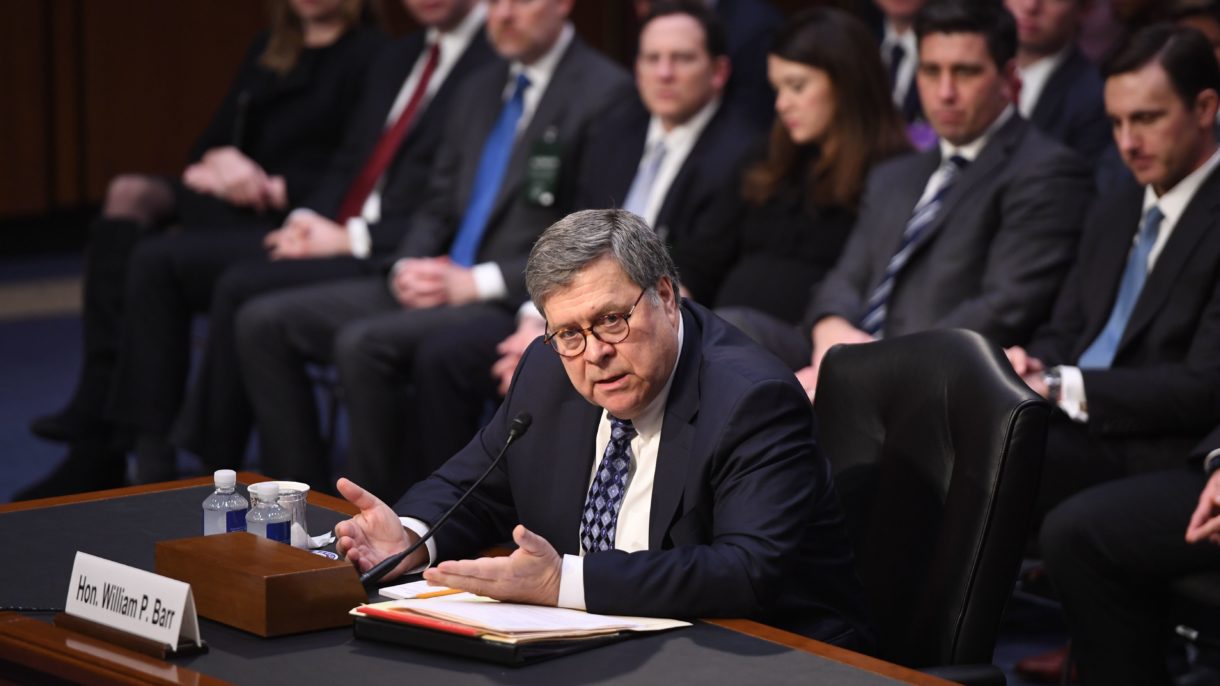Two portraits of William Barr emerged during the second day of his confirmation hearing to lead the Justice Department as President Trump’s choice as attorney general.
One was of a brilliant and moral man who oversaw the resolution of a hostage crisis at a federal prison without any casualties and another was of an early 1990s attorney general who held views on race and policing that now seem antiquated and unacceptable to many in law enforcement.
Wednesday’s testimony before the Senate Judiciary Committee, from a number of legal experts and civil rights advocates, illustrated that Barr, if confirmed, will do much more than just oversee Robert Mueller’s investigation into Russian election interference.
That investigation dominated the conversation on Tuesday, when senators got the chance to question Barr, but Wednesday’s discussion was more wide-ranging.
Barr previously served as attorney general under President George H.W. Bush from 1991 to 1993. He voiced support for aggressive incarceration policies at that time, which led to large increases in the prison population at a time when violent crime rates were skyrocketing across the country.
“As attorney general, [Barr] championed mass incarceration and deprived countless persons of color of their liberty and dramatically limited their future potential,” said Derrick Johnson, the president and CEO of the NAACP. “His Justice Department tenure was marked by extraordinarily aggressive policies that harmed people of color.”
Both Tuesday and Wednesday, Democratic senators pointed to a 1992 memo issued by Barr’s Justice Department entitled “The Case For More Incarceration.”
Barr wrote in that paper’s forward that “there is no better way to reduce crime than to identify, target, and incapacitate those hardened criminals who commit staggering numbers of violent crimes whenever they are on the streets.”
The question almost 30 years later, as Barr is nearing confirmation to be attorney general again, is whether he will abide by and enforce the First Step Act, a criminal justice overhaul bill Congress passed and Trump signed, late last year.
The law will reduce sentences for certain federal drug crimes, including ending automatic life sentences.
On Tuesday in answering questioning from Sen. Dick Durbin, D-Ill., Barr committed to implementing the new law while also defending his thinking at the time.
“The very draconian penalties on crack were put into place initially because when the crack epidemic first hit, it was like nuclear weapons going off in the inner city. A lot of the community leaders at the time [were saying] ‘this is killing us, you have to do something,'” Barr said. “I understand that things have changed since 1992.”
On Wednesday, friends and former colleagues of Barr said as well that they thought he would implement the First Step Act.
“He understands the need to do more than just lock people up,” said Larry Thompson, a former deputy attorney general.
Chuck Canterbury, the president of the National Fraternal Order of Police, who supported the First Step Act, said he had “full confidence” that Barr would implement the new law.
Still, Johnson, of the NAACP, and Marc Morial, the former mayor of New Orleans and the current president of the National Urban League, spoke ardently against confirming Barr as attorney general.
“For the past two years the Justice Department has been led by an attorney general intent on restricting civil and human rights at every turn,” Morial said, of Jeff Sessions, who Trump ousted from atop DOJ last November. “This nation needs an attorney general who will dramatically change course and enforce civil rights laws with vigor and independence… We are convinced William Barr will not do so.”
Judiciary Committee Chairman Sen. Lindsay Graham, R-S.C., said he thought the criticisms of Barr were based on his being appointed by a Republican president, and not on any disqualifying traits. Graham questioned Johnson on whether the NAACP was actually a nonpartisan organization, as it claims to be, if it approves of every Democrat on the committee and disagrees with each Republican.
“Name one Republican who you can support,” Graham also asked Morial. “I just can’t think of a better person to pick if you’re a Republican than Mr. Barr, in terms of experience, judgment and temperament. So if this guy doesn’t cut it, then I’m at a loss at who we can pick.”
Republicans on the committee mostly used their allotted time to let Barr’s allies talk about his “brilliant legal mind,” as Mary Kate Cary, a former speechwriter for George H.W. Bush, said. She also noted that Barr can speak Mandarin Chinese and plays the bagpipes.
Canterbury, of the National Fraternal Order of Police, spoke about Barr’s leadership in quelling a 1992 prison riot at the Talladega Federal Correctional Institution in Alabama. Detainees took nine hostages in the riot, and an an FBI team ultimately rescued them unharmed.
“The incident was ended because of William Barr’s decisive action,” Canterbury said.
Barr looks likely to be confirmed as the next attorney general. Although a number of Democrats have voiced doubt about whether they will vote in his favor, Republicans control the Senate and Cabinet appointees need just a simple majority to be confirmed. Should Barr be confirmed, he will take the reins of the Justice Department from acting Attorney General Matthew Whitaker and Deputy Attorney General Rod Rosenstein is expected to step down in order to allow Barr to tap his own deputy.
9(MDEwNzczMDA2MDEzNTg3ODA1MTAzZjYxNg004))
